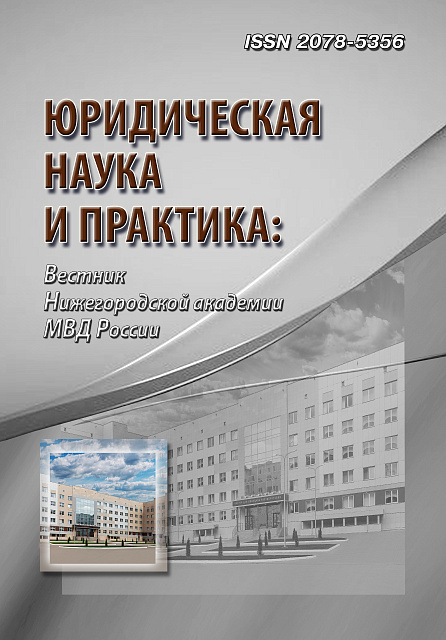The author considers the current features of the study of law enforcement practice in cases of embezzlement of budgetary funds. The analysis of the most effective research tools is presented, namely, the method of interviewing practitioners and the method of expert assessments. As an illustration of the application of these methods, the research process of studying the identity of a criminal as an element of criminalistic characteristics in cases of such a type of embezzlement of budgetary funds as fraud with maternity capital is analyzed. The paper substantiates the need for a criminologist-developer to study the materials of pre-investigation inspections, as well as the priority of identifying and investigating the most socially dangerous, highly organized embezzlement, with a corruption component. Criminology as a science should direct its main efforts to the development of methods of investigation of such crimes.
criminal identity, embezzlement in the public sector, budgetary funds, law enforcement practice, criminalistic characteristics, method of expert assessments, fraud related to maternity capital
1. On the National Security Strategy of the Russian Federation: decree of the President of the Russian Fede-ration no. 400 of February 7, 2021, paragraphs 13–14, paragraph 47. Access from the reference legal system “ConsultantPlus” (accessed 20.11.2023). (In Russ.)
2. On the control of budget spending: letter of the Ministry of Finance of the Russian Federation no. 02-09-09/103226 of November 26, 2020. Access from the reference legal system “Garant”. URL: https://www.garant.ru/products/ipo/prime/doc/400004958/#review (accessed 06.12.2023). (In Russ.)
3. The Ministry of Internal Affairs revealed embezzlement of budget funds for 16 billion rubles: online edition “Regnum” URL: https://regnum.ru/news/3728246 (accessed 08.12.2023). (In Russ.)
4. Zhuravlev S. Y. Methodological foundations for improving the methodology of investigating crimes in the field of economics. Dissertation... doctor of legal sciences. Nizhny Novgorod, 2022. 520 p. (In Russ.)
5. Garmaev Y. P. Guidelines for the search, processing and use of materials of investigative judicial practice (criminal proceedings): studies.- the method. stipend. Ulan-Ude: Baikal meridian Publ., 2019. 82 p. (In Russ.)
6. Zemskova E. N. Investigation of crimes in the field of procurement of goods, works, services for state and municipal needs. Dissertation... doctor of legal sciences. Moscow, 2018. 537 p. (In Russ.)
7. Zelensky V. D. Theoretical issues of the organization of crime investigation: monograph. Krasnodar: KubGAU Publ., 2011. 156 p. (In Russ.)
8. Cherekhovich M. M. Application of the questionnaire method in criminology on the example of studying the opinions of convicts on the effectiveness of educational work with them. Yuridicheskaya nauka, 2020, no. 1, pp. 55–61. (In Russ.)
9. Zheleznitskikh A. K. Methods of sociological research: features of application (on the example of a mass / questionnaire survey). Economics and society, 2014, no. 2-2 (11), pp. 70–76. (In Russ.)
10. Zhuravleva V. A. Method of expert assessment: historical explication and modern model. Bulletin of the Russian Academy of Sciences. Series: Sociology, 2012, no. 2, pp. 28–38. (In Russ.)
11. Anufrieva E. A. The survey method in the methodology of constructing private forensic techniques. Scientific notes of the V. I. Vernadsky Crimean Federal University. Legal sciences, 2017, no. 1, pp. 112–118. (In Russ.)
12. Garmaev Y. P. The principle of offensiveness in the disclosure and investigation of crimes by internal affairs bodies. Criminalistic support for the disclosure and investigation of crimes: materials of the X All-Russian scientific and practical table, February 26, 2016. Stavropol: SF KrU of the Ministry of Internal Affairs of Russia Publ., 2016. Part 1. Pp. 92–100. (In Russ.)
13. Chumakov A. V. Features of the methodology for investigating fraud in receiving payments. Dissertation... doctor of legal sciences. Barnaul, 2018. 239 p. (In Russ.)
14. Makarov A. V. Crime in the public sector: Concept, trends, prevention. Dissertation... doctor of legal sciences. St. Petersburg, 2005. 396 p. (In Russ.)
15. Garmaev Yu.P. The primary fight against “minor” corruption crimes as a problem of practice and criminalistic science. Lex russica (Russian law), 2023, no. 76 (3), pp. 63–71. (In Russ.)
16. Gavrilov B. Ya. Modern Russian criminal procedure legislation: the vision of a legislator, the opinion of a scientist and the position of a law enforcement officer. Judicial power and criminal procedure, 2023, no. 1, pp. 65–72. (In Russ.)












